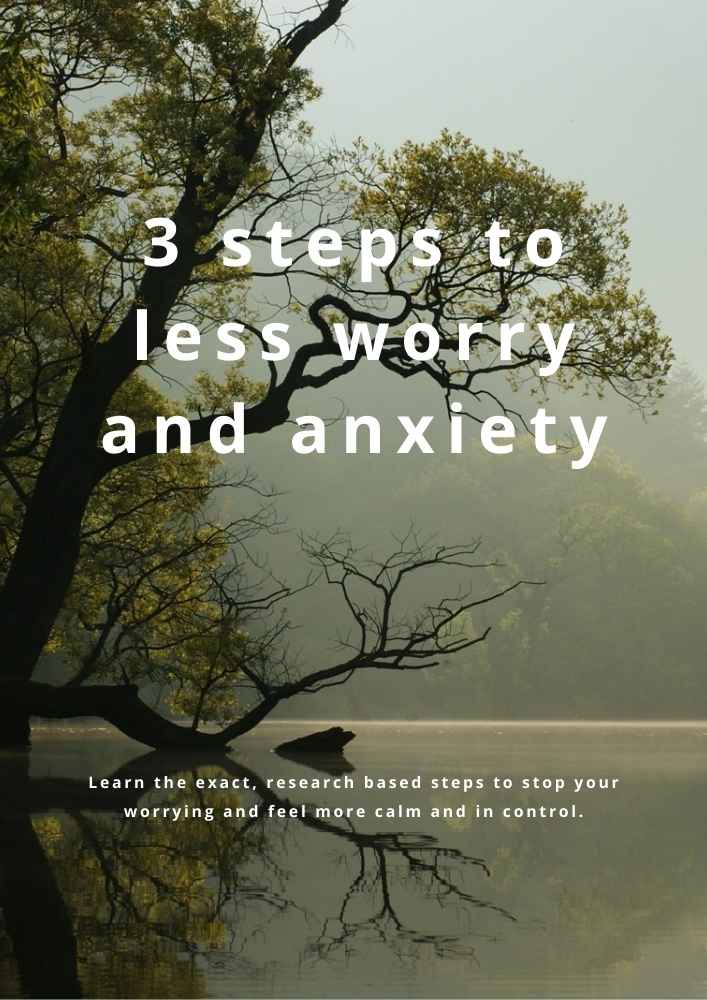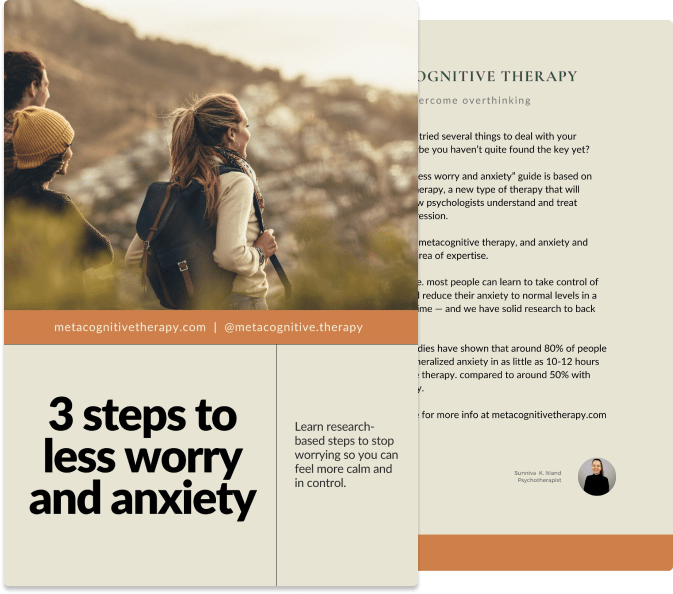How to help your child with anxiety: A parent's guide to Metacognitive Therapy

Download our best tips on reducing anxiety and worrying
Learn three powerful metacognitive therapy steps to stop the worry cycle, reduce anxiety, and feel calmer in everyday life.
.jpeg)
.jpeg)
If your child is struggling with anxiety, know that it’s a lot more common than people realize — research shows that up to 20% of children will experience an anxiety disorder before age 18, with 7% to 11% having a diagnosable anxiety disorder at any given time.
While many children experience occasional worry and nervousness, some will experience anxiety as a persistent struggle that impacts their daily lives. This can understandably be very difficult to witness as a parent, but there’s ways you can help.
How to recognize childhood anxiety
At around age five, young kids typically worry about separation from parents, or something happening to their caregivers. Older kids and adolescents more commonly develop social anxiety, worrying intensely about what others think of them, fitting in, and maintaining friendships.
Children can also develop specific phobias (fear of spiders, thunder, or darkness) which are usually more common in children than adults. They may fear new situations, people, or places, appearing shy, insecure, or clingy. Some develop generalized anxiety, worrying about multiple things simultaneously, while other kids experience specific fears like agoraphobia, preferring to stay indoors and avoid outside spaces.
Recognizing anxiety in children can be challenging, because young kids often struggle to express their fears. Instead of saying 'I'm anxious,' they might complain of stomach pains, headaches, or refuse to participate in activities. Physical symptoms can include sleep problems, nightmares, nausea, dizziness, rapid heartbeat, sweating, and even regression behaviours like bedwetting.
When nervousness leads to avoidance
Anxious children tend to become avoidant, refusing to attend school, see friends, or participate in activities they used to enjoy. They might say 'I don't want to' without explaining why, or insist on parental presence for activities they could previously handle independently.
This avoidance often appears as defiance or anger, which drives some parents to react with punishment, when in reality their child is actually overwhelmed by anxiety. When forced into scary situations, children might become desperate and angry, not out of defiance, but from genuine fear.

Download our best tips on reducing anxiety and worrying
Learn three powerful metacognitive therapy steps to stop the worry cycle, reduce anxiety, and feel calmer in everyday life.
The parent trap
Watching your child struggle with anxiety is heartbreaking. Some parents who have anxiety themselves worry about having passed it on genetically, or wonder if they somehow caused their child's worries.
In their desire to protect their kids from distress, well-intentioned parents often fall into common traps that maintain or worsen the anxiety, including:
- Requesting accommodations like allowing their child to skip class presentations
- Encouraging their kid to leave situations when feeling fearful or nauseous.
- Co-rumination, in which parents analyze and discuss all of their child’s worries, asking detailed questions about their experience and concerns, which can focus the child’s attention on problems they hadn’t been dwelling on.
While these measures are totally understandable, special accommodations can reinforce a child's belief that they can’t handle hard situations, making avoidance patterns more ingrained. And co-ruminating, or checking behaviours, can lead families to spend a lot of time analyzing negative experiences rather than building resilience.
What to say to kids with anxiety
For children under 12, proper parental guidance can be more effective than individual child therapy. Parents spend far more time with their children than therapists do, and can provide support in daily situations once they understand how to help effectively.
The first step is to normalize your child's experience — help them understand that uncomfortable feelings are a completely normal part of life. Label what's happening: 'I see you're feeling scared right now. When people feel anxious, they can worry and feel physical symptoms like this… It's normal, it’s not dangerous, and it will pass.'
Anxiety coping skills for kids (and their parents)
Instead of analyzing their worries extensively, help your child contain their worry time. When they express fear, acknowledge it with compassion, but suggest postponing detailed discussion: 'I understand you're scared about that. These are just thoughts. The good thing is, thinking about something scary doesn't make it happen. Let's focus on homework now and talk about this later if you still want to.'
Later, when you check in, your child may no longer need to discuss their worries — they might have forgotten about it entirely. This creates valuable learning opportunities that you can point out to them: 'Isn't it interesting that when you left that thought alone and played with friends, you actually forgot about it? Sometimes when we focus on what’s in front of us, these thoughts can pass on their own.'
You can help your child shift attention outward during anxious moments: If you’re watching TV, for example, you could say, 'Let's concentrate on what's happening in this show, and then see how you feel.” Later, you can ask what happened to their worried feelings. This starts to show them that they have flexibility in where they focus their attention and in how much airtime they give their worries.
Depending on their age, you can also point out how some people believe worrying helps them prepare for problems (in Metacognitive Therapy, we call this a metacognition), and then discuss whether excessive worry is actually helpful, or if it’s causing more distress.
Building courage and resilience
While it's painful to see your kid struggling, helping them to gradually face their fears is a crucial piece of overcoming anxiety. Instead of always accommodating avoidance, support them in doing scary things in manageable steps. If your child fears going to their dance class, gradually reduce your presence: first sitting inside, then outside, then leaving during class.
Give them plenty of positive feedback for effort, not just results. When your child attempts something scary, be sure to acknowledge their courage: 'You were scared of that, but you still did it. That was so brave.” For particularly challenging accomplishments, consider celebrating with special activities or experiences (try to avoid food rewards).
Managing your emotions as a parent
Supporting an anxious child can be a real challenge in managing their emotions, and your own. Some parents believe that being a good parent means constantly worrying about their child, but this creates stress for everyone involved… your ability to help your child manage anxiety will improve when you can manage your own emotional responses.
Helping your kids face their fears and build confidence is one of the greatest gifts you can give. If you're struggling with your own anxiety, or feeling overwhelmed by your child's needs, you can book a session with a Metacognitive Therapy-certified psychologist here.



